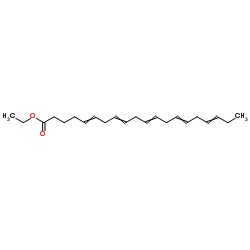Usefulness of colon targeted DHA and EPA as novel diabetes medications that promote intrinsic GLP-1 secretion.
Mariko Morishita, Tomohiro Tanaka, Takayuki Shida, Kozo Takayama
Index: J. Control. Release 132(2) , 99-104, (2008)
Full Text: HTML
Abstract
Glucagon-like peptide-1 (GLP-1) is a gut-derived peptide secreted from intestinal L-cells and now considered as an ideal diabetic medicine. Recently, it was reported that the unsaturated fatty acid alpha-linoleic acid promotes the secretion of GLP-1 via a G protein-coupled receptor, GPR120. However, the effects of long-chain polyunsaturated fatty acids on the secretion of GLP-1 have not been examined in vivo. The aim of this study was to evaluate the effects of the long-chain polyunsaturated fatty acids docosahexaenoic acid (DHA) and eicosapentaenoic acid (EPA) on blood glucose levels, plasma insulin, and GLP-1 concentrations. In addition, site-specific differences in these effects were determined using several intestinal segments: stomach, jejunum, and colon. After an intraperitoneal glucose administration (1.5 mg/g weight), each mouse was administered vehicle or an alpha-linoleic acid, DHA, EPA or EPA ester (EPA-E) solution to each intestinal segment. After an intraperitoneal glucose challenge, marked endogenous GLP-1 secretion, substantial insulin release and subsequent glucose reductions were observed in the intracolonic DHA and EPA treatment groups. In contrast, DHA and EPA did not increase GLP-1 secretion when given in the other segments. These data suggested that the colon-specific delivery of DHA, EPA, and possibly EPA-E would be a novel antidiabetic treatment by the stimulation of intrinsic GLP-1 secretion.
Related Compounds
| Structure | Name/CAS No. | Molecular Formula | Articles |
|---|---|---|---|
 |
eicosapentaenoic acid ethyl ester
CAS:73310-10-8 |
C22H34O2 |
|
Protective effects of prescription n-3 fatty acids against i...
2011-07-01 [Food Funct. 2(7) , 386-94, (2011)] |
|
Identification of inflammatory and proresolving lipid mediat...
2008-06-01 [Am. J. Hematol. 83(6) , 437-45, (2008)] |
|
Highly purified eicosapentaenoic acid prevents the progressi...
2009-04-01 [Prostaglandins Leukot. Essent. Fatty Acids 80(4) , 229-38, (2009)] |
|
Does eicosapentaenoic acid (EPA) inhibit cerebral vasospasm ...
2008-07-01 [Acta Neurol. Scand 118(1) , 54-9, (2008)] |
|
Oral administration of eicosapentaenoic acid or docosahexaen...
2014-04-01 [J. Nutr. 144(4) , 467-74, (2014)] |